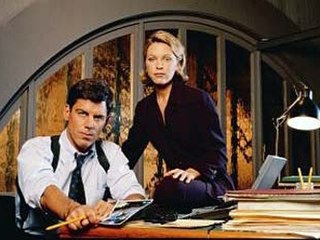
The Cars That Ate Paris is a 1974 Australian horror comedy film, produced by twin brothers Hal and Jim McElroy and directed by Peter Weir. It was his first feature film, and was also based on an original story he had written. Shot mostly in the rural town of Sofala, New South Wales, the film is set in the fictional town of Paris in which most of the inhabitants appear to be directly, or indirectly, involved in profiting from the results of car accidents. The film is considered part of the Australian New Wave genre.

Jonathan "Jono" Harry Coleman was an English-born television presenter, radio announcer, writer, comedian, and advertorial spokesperson. He was known for his career in his native country and Australia.

The Odd Angry Shot is an 1979 Australian war comedy film written, directed and produced by Tom Jeffrey. It is based on the book of the same title by William Nagle, and follows the experiences of Australian soldiers during the Vietnam War. The movie, which was shot on location in New South Wales and Canungra, Queensland, traces the tour of duty of an Australian Special Air Service Regiment reconnaissance team from their departure to their return home to Australia. It avoids much of the political comment on Australia’s involvement in Vietnam, unlike Hollywood films which tend to explore the rights and wrongs of the Vietnam War.

Murder Call is an Australian television series, created by Hal McElroy for the Southern Star Entertainment and broadcast on the Nine Network between 1997 and 2000. The series was inspired by the Tessa Vance novels by Jennifer Rowe, both of which were adapted as episodes, while Rowe also developed story treatments for 38 episodes throughout the series.

Avril Lavigne: My World is the first live album/DVD by Canadian singer-songwriter Avril Lavigne, released on November 6, 2003. The DVD consists of 16 songs that Lavigne performed on her first live performance tour, the Try to Shut Me Up Tour at HSBC Arena in Buffalo, New York. Most of the tracks are taken from her debut album, Let Go, while two of the songs are covers. It also features one B-side song. On the live CD, three songs are covers and one is a single.
Rafferty's Rules is an Australian television drama series which ran from 1987 to 1991 on the Seven Network.

Ryan is an Australian adventure television series screened by the Seven Network from 27 May 1973. The series was produced by Crawford Productions and had a run of 39 one-hour episodes.
Dimboola is a 1979 Australian independent film directed by John Duigan about a country wedding reception. It is based on the 1969 play of the same name by Jack Hibberd and was principally filmed on location in Dimboola, Victoria.

Mad Dog Morgan is a 1976 Australian bushranger film directed by Philippe Mora and starring Dennis Hopper, Jack Thompson and David Gulpilil. It is based upon the life of Dan Morgan.
The 21st Annual Australian Recording Industry Association Music Awards were held on 28 October 2007 at the Acer Arena at the Sydney Olympic Park complex. Rove McManus was the host of the event. The nominees for all categories were announced on 19 September, while the winners of the Artisan Awards were announced on that same day.
Underbelly: Razor, the fourth series of the Australian Nine Network crime drama anthology series Underbelly, originally aired from 21 August 2011 to 6 November 2011. It is a thirteen-part series detailing real events that occurred in Sydney between 1927 and 1936. The series depicts the "razor gangs" who controlled the city's underworld during the era and the violent war between the two "vice queen" powers, Tilly Devine and Kate Leigh. It is also the last season in the Underbelly franchise that contains 13 episodes. In contrast to the previous Underbelly instalments, which were based on books by John Silvester and Andrew Rule, Razor is based on the Ned Kelly Award-winning book of the same name, written by Larry Writer.
Killing Time is an Australian television drama series on TV1 subscription television channel which first screened in 2011. It is based on the true story of disgraced lawyer Andrew Fraser. In New Zealand it screens on Prime Television.
Peter Cummins is an Australian retired character actor of stage and screen and chorister who was especially prominent in the 1970s and appeared in some of the most famous Australian films of the period.
Greenkeeping is a 1992 Australian film directed by David Caesar.

Janet King is an Australian television drama program which began airing on ABC1 from 27 February 2014. It was created as a spin-off from the 2011 legal drama Crownies. It follows the story of Senior Crown Prosecutor Janet King, tracking her journey in Series 1 in the Department of Public Prosecutions to a Royal Commission into Serious Firearm Crime in Series 2 to the National Crime Commission in Series 3.
Sydney Speedway was a dirt track racing venue on the site of the Granville Showgrounds in Sydney.
Cameron Beck Allan was an Australian-born American-based composer, record producer, filmmaker and former label owner. In September 1978 he co-founded the record label Regular Records with fellow filmmaker Martin Fabinyi. Their first signing was the new wave group Mental As Anything, and their second was the pub rock band Flowers. Allan produced both groups' early work. His TV and film music compositions include Stir (1980), The Umbrella WomanKojak: Ariana (1989), and Kojak: Flowers for Matty (1990). In 1986 he relocated to the United States and in July 1992 he married Margaret Wertheim, a science writer. The couple had separated by 2007. Cameron Allan died of liver failure, after a transplant, aged 57.







